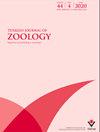塞尔维亚三种本土犬科动物的身体状况
IF 1.3
4区 生物学
Q2 ZOOLOGY
引用次数: 0
摘要
:根据肾脂肪指数(KFI)的值评估了塞尔维亚三种本地犬科动物(狼-犬狼疮、豺狼-金黄色犬和狐狸-外阴溃疡)的身体状况。在十年的时间里,共收集了1232个标本(147只狼、711只豺狼和375只狐狸)。根据性别、年龄、季节、物种和属等多种因素对数据进行分析。结果表明,犬属成年成员的身体状况明显好于一岁以下的幼犬和秃鹫属的代表(F(2900)=71.465,p=0.000)。不同季节的KFI在豺(F(3542)=6.912,p<0.001)和狐狸(F(371)=2.675,p<0.05)种群中有显著差异。冬季,当雌性的身体状况明显好于雄性时,豺的KFI最高。这三种犬科动物都没有表现出性别之间身体状况的显著差异,尽管雌性的KFI略高。在成年雌性豺中,哺乳期的豺与其他成年和怀孕期的雌性之间的KFI存在差异(H(2,n=220)=8.339,p=0.016)。在冬季自然发生的食物剥夺不会影响这些捕食者的身体条件状态,因为它们为即将到来的繁殖季节做好了充分准备。总体而言,尽管在属水平上观察到差异,但通过KFI指数测量的这些本地犬科动物的身体状况表明,塞尔维亚狼、豺狼和狐狸的平均健康状况良好。本文章由计算机程序翻译,如有差异,请以英文原文为准。
Body condition of three autochthonous canid species from Serbia
: The body condition of three autochthonous canid species in Serbia (wolf– Canis lupus , jackal– Canis aureus, and fox– Vulpes vulpes ) was assessed based on the value of Kidney Fat Index (KFI). A total of 1232 specimens (147 wolves, 711 jackals, and 375 foxes) were collected during a ten years period. Data were analyzed according to multiple factors such as sex, age, seasons, species, and genus. The results indicate that the adult members of the Canis genus have a significantly better body conditional status than the yearlings as well as the representatives of the Vulpes genus (F (2, 900) = 71.465, p = 0.000). Significant differences in KFI across seasons are recorded in jackal (F (3, 542) = 6.912, p < 0.001) and fox (F (3, 371) = 2.675, p < 0.05) populations. Jackals have the highest KFI during winter when females are in significantly better body condition than males. None of these three canid species has shown significant difference in body condition between sexes, although females had slightly higher KFI. Among adult female jackals, a difference in KFI between nursing ones and other adult and pregnant females is observed (H (2, n = 220) = 8.339, p = 0.016). Food deprivation which occurs naturally during the winter months does not affect the body conditional status of these predators which are well prepared for the upcoming breeding season. Considered as a whole, in spite of the differences observed at the genus level, the body condition status of these autochthonous canids measured through KFI index indicates decent average fitness status in wolves, jackals, and foxes in Serbia.
求助全文
通过发布文献求助,成功后即可免费获取论文全文。
去求助
来源期刊

Turkish Journal of Zoology
ZOOLOGY-
CiteScore
2.30
自引率
10.00%
发文量
24
审稿时长
6-12 weeks
期刊介绍:
The Turkish Journal of Zoology is published electronically 6 times a year by the Scientific and Technological Research Council of Turkey (TÜBİTAK).
-Accepts English-language manuscripts in various fields of zoology including systematics, developmental biology, behaviour biology, animal models, molecular biology and molecular phylogeny, genomics, physiology (cell communication and signaling systems), biochemistry and immunohistochemistry, applied parasitology and pathology, nanobiotechnology, ecology, evolution, and paleontology of animal taxa.
-Contribution is open to researchers of all nationalities.
-Short communications are also welcome, such as reports of a preliminary nature or those including new records from specific localities or regions, and the editor reserves the right to decide that a paper be treated as a short communication.
-The papers that deal with purely checklists, new host and non-regional new locality records will not be consider for publication.
-Letters to the editor reflect the opinions of other researchers on the articles published in the journal. The editor may also invite review articles concerning recent developments in particular areas of interest.
 求助内容:
求助内容: 应助结果提醒方式:
应助结果提醒方式:


